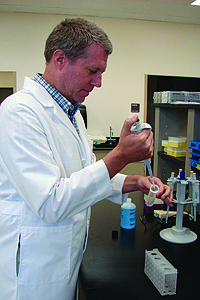New Venture Puts TTUHSC in the Mix With Biotech Industry

ExperImmune offers full-scale laboratory support for all major phases of a customer’s immunological research and development.
A technology partnership between the Development Corporation of Abilene (DCOA) and the Center for Immunotherapeutic Development at TTUHSC has resulted in a new concept for business-driven academic commercialization.
The face of the new commercialization venture is ExperImmune, an immunology centric corporate entity formed to provide third-party validation services, product development and due diligence to support technologies like those found at TTUHSC and other academic-based institutions.
The company also provides services to small and large biotechnology companies, major pharmaceutical companies and investment groups, said Jon Weidanz, Ph.D., ExperImmune’s chief scientist and founding director. Weidanz is also professor and chair for the Department of Immunotherapeutics and Biotechnology at the School of Pharmacy in Abilene.
“We provide the transition between research and development,” Weidanz said. “This is an exciting opportunity for ExperImmune to be a research and development partner to address the immunology and related needs of academia and the biotech industry.”
Through its 24,000-square-foot space inside Abilene Laboratories, ExperImmune has access to state-of-the-art instrumentation and clean room facilities to perform immune-based assay design and biopharmaceutical development and production for pre-clinical validation. In addition to immunodiagnostic and immunotherapeutic development, ExperImmune offers pre-clinical in-vitro and in-vivo efficacy models for oncology, pharmacokinetic and immunogenicity studies.
ExperImmune’s research and development team members come from diverse backgrounds and fields of expertise. Though their focus lies within the immunology field, team scientists have extensive experience in cancer biology, infectious disease, molecular and cellular immunology, proteomics and biomaterial science.
In addition to their contract services, Weidanz said ExperImmune is preparing to launch a product line of monoclonal antibodies for research purposes across a range of disciplines, including cancer, autoimmunity and infectious disease. The company is also developing a propriety method to allow detection of antigen-specific T cells and B cells from mouse and human samples.
Weidanz said partnerships with the DCOA and TTUHSC allow ExperImmune to operate with low overhead and gives the company the flexibility to offer services at a relatively low cost, maximize research dollars and provide customers with a personalized approach.
Related Stories
Celebrating Veterans: TTUHSC’s General Martin Clay’s Legacy of Service and Leadership
From his initial enlistment in the Army National Guard 36 years ago to his leadership in military and civilian health care management roles, Major General Martin Clay’s career has been shaped by adaptability, mission focus and service to others.
Texas Tech University Health Sciences Center School of Nursing Named Best Accelerated Bachelor of Science in Nursing Program in Texas
The TTUHSC School of Nursing Accelerated Bachelor of Science in Nursing (BSN) program has been ranked the No. 1 accelerated nursing program in Texas by RegisteredNursing.org.
TTUHSC Names New Regional Dean for the School of Nursing
Louise Rice, DNP, RN, has been named regional dean of the TTUHSC School of Nursing on the Amarillo campus.
Recent Stories
The John Wayne Cancer Foundation Surgical Oncology Fellowship Program at Texas Tech University Health Sciences Center Announced
TTUHSC is collaborating with the John Wayne Cancer Foundation and has established the Big Cure Endowment, which supports the university’s efforts to reduce cancer incidence and increase survivability of people in rural and underserved areas.
TTUHSC Receives $1 Million Gift from Amarillo National Bank to Expand and Enhance Pediatric Care in the Panhandle
TTUHSC School of Medicine leaders accepted a $1 million philanthropic gift from Amarillo National Bank on Tuesday (Feb. 10), marking a transformational investment in pediatric care for the Texas Panhandle.
Texas Tech University Health Sciences Center Permian Basin Announces Pediatric Residency Program Gift
TTUHSC Permian Basin, along with the Permian Strategic Partnership and the Scharbauer Foundation, Feb. 5 announced a gift that will fund a new pediatric residency.
